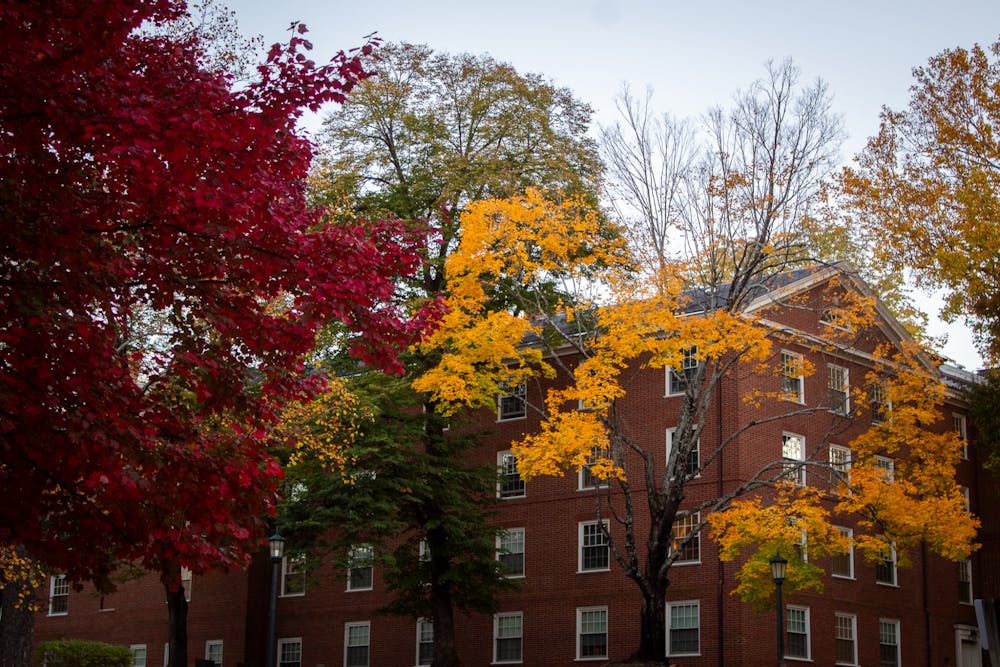Carbon emissions are down by 44.6 percent at the University, per the Committee on Sustainability’s 2022-23 annual report. According to the report, the group remains on track to achieve the goals of its long term sustainability plan, including becoming carbon neutral and fossil fuel free by 2030.
These goals are housed under the University's 2030 Plan, which outlines long-term plans to make the University the “best public university by 2030.” As seen in the report, the University achieved several of these goals in 2022, including reducing nitrogen emissions by 30 percent and increasing the amount of sustainable food purchased to 30 percent. Nitrogen emissions have now decreased 43.6 percent since 2010, and 35 percent of food purchases in 2022 were sustainable.
Colette Sheehy, co-chair of the University Committee on Sustainability and senior vice president for operations and state government relations, said the University is well on its way to achieving remaining sustainability goals.
“There is still much more work to do as the University continues to grow, and U.Va. is continually implementing new strategies to reduce the carbon intensity of how we generate energy and how we consume energy in buildings,” Sheehy said in a written statement to The Cavalier Daily.
Sheehy also said the 44.6 percent decrease in carbon emissions was achieved despite overall growth in building square footage and population size. Recent University expansions include two new upper-class residence halls on Brandon Avenue, renovations on Alderman Library, the construction of the School of Data Science and the Contemplative Commons.
The University was recognized by the U.S. Department of Energy for meeting the Better Buildings Challenge Goal for 2023, per the report. The challenge pushes businesses, manufacturers, cities, states, universities and school districts to commit to reduce energy use by 20 percent over ten years — the University exceeded the goal this year with a 27 percent reduction.
Organizers of the plan also aim to engage the University community building sustainability resources on Grounds and discovering solutions to global sustainability challenges, as the report outlines.
The report notes that last year, the University’s 3,000 acre Morven Farm was designated as the “Sustainability Lab” to allow for further experiential education, research and engagement in alignment with the University’s sustainability goals. Through the farm’s Morven Summer Institute, professors teach courses surrounding ethical sustainability. Morven Farm also includes a kitchen garden featuring student workdays, internship and leadership programs for students to grow food sustainably.
The report also highlights collaborations with classes that promote sustainability goals, such as the “Food Justice” class — students participated in over 25 Morven Garden workdays over the fall semester. The “Designing a Carbon Neutral Future” course allowed students to collaborate with the School of Nursing, University Recreation, Monticello and local business WillowTree towards carbon reduction goals.
The School of Architecture hosted a Climate Transformations Symposium this March that showcased climate-conscious designs and research happening at the University and elsewhere. The University also began its Summer Decarbonization Academy in 2022, with 13 student participants. The annual program geared towards sustainability education is open to rising third and fourth-year students enrolled in any University program.
“U.Va.'s approach to sustainability emphasizes the importance of individual action to make small changes that add up, as well as collaboration to develop large-scale solutions,” Sheehy said. “Many of the decisions that we all make each day, both small and large, have the potential to reduce U.Va.'s environmental footprint and to work towards addressing our most pressing challenges.”







